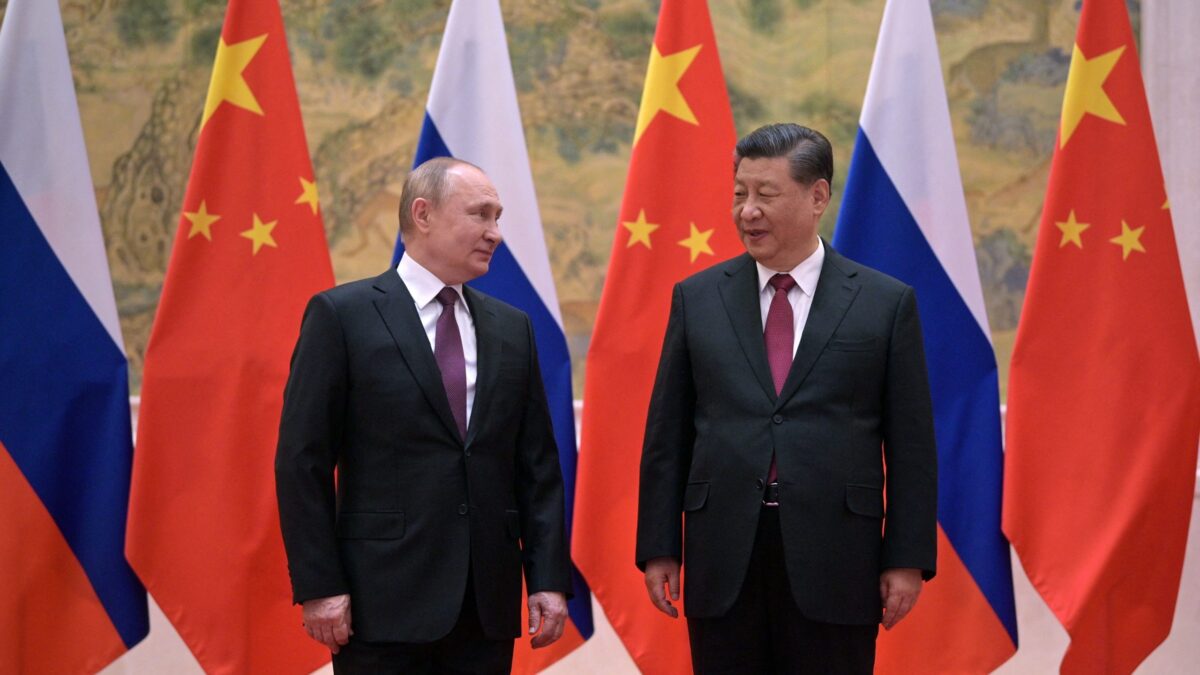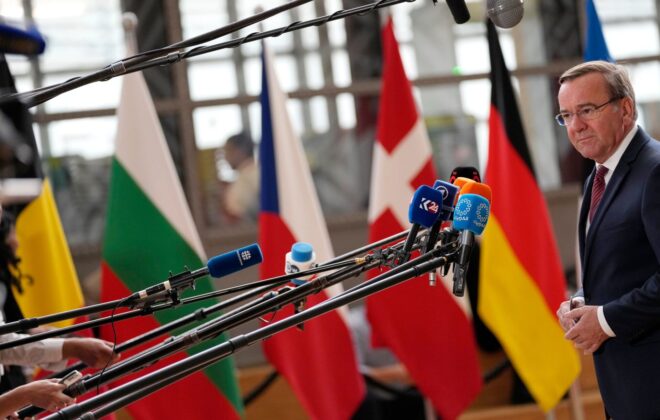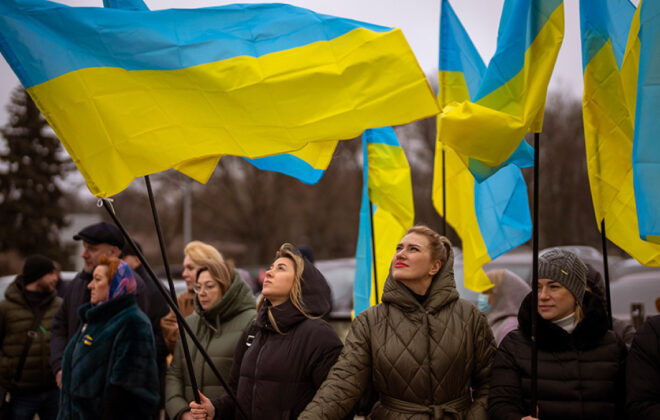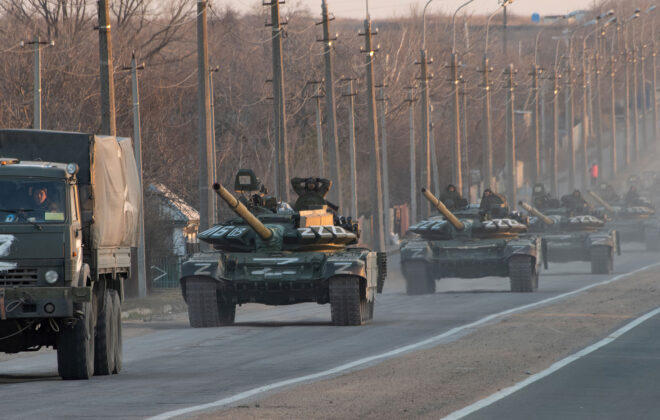The Russia-Ukraine War in Germany VII. Negotiations with Putin – a foolish hope.
“Peace against land”– handing over part of the Ukrainian population to the enemy for forced Russification.
“Peace against land”, i.e., cessation of hostilities against the land conquered by the Russian army to the east and south of any future ceasefire line, is not a peace solution for Ukraine – should such a solution be imposed on it by war-weary Western allies or forced upon it by cessation of Western supplies of arms and ammunition. Putin would attack Ukraine again at the next favourable “opportunity” that he himself would bring about. Putin will not stop warring on Ukraine until he has brought the whole country under his control.
The majority of the Ukrainian population, even after a year of war, unabatedly supports the Ukrainian army’s struggle to regain Ukrainian control over Ukrainian territory within the borders of January 2014: according to the two renowned institutes “Democratic Initiatives Foundation” and “Razumkov Centre”, the figure is 54 %. Only 18 % would be willing to cede land to Russia in exchange for peace. 60 % consider a negotiated peace with Russia impossible.
However, Ukrainian soldiers in the “liberated areas” in the Donbas also have unpleasant experiences: There are people living here who do not want to be “liberated” by the Ukrainian army at all; even where the Russian army has not (yet) advanced, there are Ukrainian citizens who would welcome its arrival (“strew flowers”).1
Many foolish politicians and commentators in the West called on Ukraine to negotiate with Putin, criticises Anders Åslund, a vehement opponent of Western appeasement. Putin has proven that his word is worthless. He feels – like Hitler – no obligation to keep a promise. He justifies violations of international agreements with lies.
Negotiations on territorial secessions are inevitable, says Charles Kupchan, special adviser to US President Barack Obama.2 But territorial secessions are no guarantee against renewed Russian aggression, because Putin is not interested in territorial shares in Ukraine; he wants the whole of Ukraine.
Whenever Putin engages in negotiations, he does so “in bad faith”, with the intention of deception – as in Minsk in February 2015 (“Minsk II”3). Any willingness to negotiate would be expressed by Putin with the ulterior motive of softening the West’s resolve in supporting Ukraine, destroying its unity and breaking up existing lines of conflict.
In the negotiations on the “Minsk Agreement” (“Minsk II”) of 12 February 2015, which was impossible to fulfil from the outset and on whose “perfect implementation” Putin and his “foreign spokesman” Sergei Lavrov insisted at every opportunity, the Russian president dragged French President Hollande and the (overtired) German Chancellor Merkel across the negotiating table. In the “Minsk Agreement”, Putin had assigned the two secession territories “DNR” and “LNR” in the Donbas the role of a team of two Trojan horses, which he planned to use within the Ukrainian state to gain control over the whole of Ukraine.4
The “Minsk diplomacy” did not avert the threat of a Russian war of aggression against Ukraine, but only postponed it for seven years. Seven years after “Mink II”, Putin had to realise that his plan was not working and could not be expected to work out. This is probably why he decided to tackle his goal – the subjugation of Ukraine – militarily.
The hope expressed by various sides in the West that the Russian war of conquest and annihilation can be brought to a face-saving end for Putin through territorial concessions in a negotiated peace is an illusion resulting from a false assessment of the ruler in the Kremlin.
The Russian president’s press secretary, Dmitry Peskov stated on 3 July (2022) that Kiev must “accept the conditions of the Russian Federation, agree with them and sit down at the negotiating table to fix them in a document.” Further, Peskov claimed, “Western countries led by Washington do not allow Ukrainians to even think about peace, let alone talk about peace…”. However, he believes that “sooner or later, common sense will prevail in the West and negotiations on Ukraine will resume”. Commenting on Ukrainian President Selenskyj’s call to the “G7” summit on 27 June 2023 to do everything possible to end Russia’s invasion of Ukraine by the end of the year, Peskov said that Ukraine could end the war within 24 hours if it laid down its arms and capitulated.
Mikhail Podolyak, the advisor to the head of the Presidential Office (Ofis Prezidenta, “OP”) of the Ukrainian president, commented that Ukraine would not end the war it had not started “by order”. Ukraine’s conditions for negotiations were an immediate ceasefire, the withdrawal of Russian troops (“Z troops”) from Ukraine, the return of abducted Ukrainian citizens, the extradition of war criminals, reparations and the recognition of Ukraine’s sovereign rights.
In December 2022, Moscow stepped up the campaign for “peace negotiations” with the aim of halting the delivery of Western tanks to the Ukrainian army and buying time to prepare its own offensives. This propaganda campaign aims at a rupture between the West and Ukraine, the cessation of Western support for Ukraine and the weakening of Western cohesion.
China’s Position Paper of 20 February 2023
On 20 February 2023, the Ministry of Foreign Affairs of the People’s Republic of China published a 12-point paper entitled: “China’s Position on the Political Settlement of the Ukraine Crisis”5, which former Foreign Minister (2013 – 2022) Wang Yi6 had announced at the Munich Security Conference on 18 February 2023 – and which was also hopefully apostrophised in the West as a “Chinese peace plan”. (On 21 February, Wang Yi visited Moscow, where he announced a visit to Moscow by Chinese President Xi Jinping in talks with President Putin.7)
Putin’s spokesman Dmitry Peskov thanked the “Chinese friends”; the “Chinese peace plan” (“mirnyj plan”) is being studied in Moscow, but they do not yet see any conditions for a peaceful solution (“vychod v mirnoe ruslo”); the special operation (SVO) is proceeding according to plan. Moscow’s reaction to the Chinese position paper clearly expresses that Putin wants to continue his war against Ukraine.
German foreign policy expert Norbert Röttgen, MdB / CDU, considers the Chinese position paper a “diplomatic coup”. China has succeeded in having its position paper perceived in the West as a “peace plan” and China itself as a “peacemaker”. Röttgen, however, does not believe that China will supply weapons to Russia; this would counteract China’s aspired image as a “peace power”.
Röttgen criticises the Chinese paper for blurring the essential differences: It was not Russia that had invaded Ukraine, but both countries, Russia and Ukraine, were at war with each other; and both sides would have to cease their hostilities. But if Russia did so, peace would return; if Ukraine stopped fighting back, it would cease to exist, Röttgen said in the TV talk of moderator Markus Lanz” on 24 February 2023.
Ukrainian President Zelenskyj did not assess the Chinese proposal as a “peace plan”, but saw positive elements in the Chinese initiative. He stated on 24 February 2023 that he wanted a personal meeting with Chinese leader Xi Jinping. Commenting on Zelensky’s wish for a meeting with Xi Jinping, the Chinese Foreign Ministry spokesperson said that China supports liaising with all sides of the “Russian-Ukrainian conflict”.
In fact, point 1 of the position paper can be read as a – disguised – reminder to Moscow: “Universally recognised international law, including the purposes and principles of the United Nations Charter, must be strictly observed. The sovereignty, independence and territorial integrity of all countries must be effectively upheld.”
After this indirect admonition to Moscow, point 2 demands – indirectly – that NATO take Russia’s security interests seriously; NATO’s eastward expansion is criticised: “The security of a region should not be achieved by strengthening or expanding military blocs.
The general statement “war benefit(s) no one” in point 3 will probably – officially – not be contradicted by any power. However, the formulation “all parties must […] exercise restraint” puts attackers and victims on an equal footing.
Furthermore, “all parties” (who is meant remains unclear) are called upon to “support Russia and Ukraine in working in the same direction and resuming direct dialogue as quickly as possible, so as to gradually de-escalate the situation and ultimately reach a comprehensive ceasefire”.
Point 4 identifies negotiations as “the only viable solution to the Ukraine crisis”. The international community should create the conditions for the resumption of negotiations. “China will continue to play a constructive role in this regard.”
Points 5 and 6 can be read as criticism of Russian warfare, specifically of Russian attacks on the civilian population: “The safety of civilians must be effectively protected” (point 5). “Parties to the conflict should strictly abide by international humanitarian law, avoid attacking civilians or civilian facilities” (point 6).
The sentence “The threat or use of nuclear weapons should be opposed” can be understood as criticism of Putin’s nuclear threats. In paragraph 10, China calls for a halt to “unilateral sanctions” that are not authorised by the UN Security Council – thus accommodating Russia.
Fußnoten
- The author learned about this from Ukrainian soldiers on vacation and from women who fled to Germany and whose parents stayed in Ukraine.
- Charles A. Kupchan is a senior fellow in the Council on Foreign Relations (CFR) and professor of international affairs at Georgetown University (Washington) in the Walsh School of Foreign Service and Department of Government.
- See Winfried Schneider-Deters: Ukraine’s Fateful Years 2013 – 2019, Stuttgart (IBIDEM) 2022, Volume II, Chapter III.12 – III.19.
- In the “Minsk Agreement” (“Minsk II”), Putin assigned the two so-called People’s Republics “DNR” and “LNR” in the Ukrainian Donbas the role of a team of two Trojan horses, which he wanted to use as a lever of influence within the Ukrainian state in order to gain control of all of Ukraine.
- https://www.fmprc.gov.cn/mfa_eng/zxxx_662805/202302/t20230224_11030713.html.
- Since 2023, Wang Yi has been director of the Bureau of the Chinese Communist Party’s Central Commission on Foreign Affairs, to which the Ministry of Foreign Affairs reports; Wang Yi is thus the highest-ranking diplomat in the People’s Republic of China.
- Al Jazeera: Wang Yi meets Putin in sign of deepening China-Russia ties, 23. Feb 2023, https://www.aljazeera.com/news/2023/2/23/wang-yi-meets-putin-in-sign-of-deepening-china-russia-ties. Simone McCarthy, CNN’s Beijing bureau, Anna Chernova and Uliana Pavlova: China’s top diplomat visits Moscow ahead of anniversary of Russia’s Ukraine invasion, 22.02.2023; https://edition.cnn.com/2023/02/21/china/china-wang-yi-russia-moscow-visit-intl-hnk/index.html.





